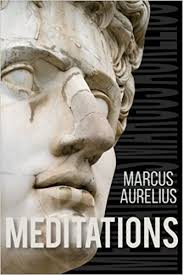Meditations Page #20
Meditations is a series of personal writings by Marcus Aurelius, Roman Emperor from 161 to 180 AD, recording his private notes to himself and ideas on Stoic philosophy. Marcus Aurelius wrote the 12 books of the Meditations in Koine Greek as a source for his own guidance and self-improvement.
XVIII. Honour that which is chiefest and most powerful in the world, and that is it, which makes use of all things, and governs all things. So also in thyself; honour that which is chiefest, and most powerful; and is of one kind and nature with that which we now spake of. For it is the very same, which being in thee, turneth all other things to its own use, and by whom also thy life is governed. XIX. That which doth not hurt the city itself; cannot hurt any citizen. This rule thou must remember to apply and make use of upon every conceit and apprehension of wrong. If the whole city be not hurt by this, neither am I certainly. And if the whole be not, why should I make it my private grievance? consider rather what it is wherein he is overseen that is thought to have done the wrong. Again, often meditate how swiftly all things that subsist, and all things that are done in the world, are carried away, and as it were conveyed out of sight: for both the substance themselves, we see as a flood, are in a continual flux; and all actions in a perpetual change; and the causes themselves, subject to a thousand alterations, neither is there anything almost, that may ever be said to be now settled and constant. Next unto this, and which follows upon it, consider both the infiniteness of the time already past, and the immense vastness of that which is to come, wherein all things are to be resolved and annihilated. Art not thou then a very fool, who for these things, art either puffed up with pride, or distracted with cares, or canst find in thy heart to make such moans as for a thing that would trouble thee for a very long time? Consider the whole universe whereof thou art but a very little part, and the whole age of the world together, whereof but a short and very momentary portion is allotted unto thee, and all the fates and destinies together, of which how much is it that comes to thy part and share! Again: another doth trespass against me. Let him look to that. He is master of his own disposition, and of his own operation. I for my part am in the meantime in possession of as much, as the common nature would have me to possess: and that which mine own nature would have me do, I do. XX. Let not that chief commanding part of thy soul be ever subject to any variation through any corporal either pain or pleasure, neither suffer it to be mixed with these, but let it both circumscribe itself, and confine those affections to their own proper parts and members. But if at any time they do reflect and rebound upon the mind and understanding (as in an united and compacted body it must needs;) then must thou not go about to resist sense and feeling, it being natural. However let not thy understanding to this natural sense and feeling, which whether unto our flesh pleasant or painful, is unto us nothing properly, add an opinion of either good or bad and all is well. XXI. To live with the Gods. He liveth with the Gods, who at all times affords unto them the spectacle of a soul, both contented and well pleased with whatsoever is afforded, or allotted unto her; and performing whatsoever is pleasing to that Spirit, whom (being part of himself) Jove hath appointed to every man as his overseer and governor. XXII. Be not angry neither with him whose breath, neither with him whose arm holes, are offensive. What can he do? such is his breath naturally, and such are his arm holes; and from such, such an effect, and such a smell must of necessity proceed. 'O, but the man (sayest thou) hath understanding in him, and might of himself know, that he by standing near, cannot choose but offend.' And thou also (God bless thee!) hast understanding. Let thy reasonable faculty, work upon his reasonable faculty; show him his fault, admonish him. If he hearken unto thee, thou hast cured him, and there will be no more occasion of anger. XXIII. 'Where there shall neither roarer be, nor harlot.' Why so? As thou dost purpose to live, when thou hast retired thyself to some such place, where neither roarer nor harlot is: so mayest thou here. And if they will not suffer thee, then mayest thou leave thy life rather than thy calling, but so as one that doth not think himself anyways wronged. Only as one would say, Here is a smoke; I will out of it. And what a great matter is this! Now till some such thing force me out, I will continue free; neither shall any man hinder me to do what I will, and my will shall ever be by the proper nature of a reasonable and sociable creature, regulated and directed. XXIV. That rational essence by which the universe is governed, is for community and society; and therefore hath it both made the things that are worse, for the best, and hath allied and knit together those which are best, as it were in an harmony. Seest thou not how it hath sub-ordinated, and co-ordinated? and how it hath distributed unto everything according to its worth? and those which have the pre-eminency and superiority above all, hath it united together, into a mutual consent and agreement. XXV. How hast thou carried thyself hitherto towards the Gods? towards thy parents? towards thy brethren? towards thy wife? towards thy children? towards thy masters? thy foster-fathers? thy friends? thy domestics? thy servants? Is it so with thee, that hitherto thou hast neither by word or deed wronged any of them? Remember withal through how many things thou hast already passed, and how many thou hast been able to endure; so that now the legend of thy life is full, and thy charge is accomplished. Again, how many truly good things have certainly by thee been discerned? how many pleasures, how many pains hast thou passed over with contempt? how many things eternally glorious hast thou despised? towards how many perverse unreasonable men hast thou carried thyself kindly, and discreetly? XXVI. Why should imprudent unlearned souls trouble that which is both learned, and prudent? And which is that that is so? she that understandeth the beginning and the end, and hath the true knowledge of that rational essence, that passeth through all things subsisting, and through all ages being ever the same, disposing and dispensing as it were this universe by certain periods of time. XXVII. Within a very little while, thou wilt be either ashes, or a sceletum; and a name perchance; and perchance, not so much as a name. And what is that but an empty sound, and a rebounding echo? Those things which in this life are dearest unto us, and of most account, they are in themselves but vain, putrid, contemptible. The most weighty and serious, if rightly esteemed, but as puppies, biting one another: or untoward children, now laughing and then crying. As for faith, and modesty, and justice, and truth, they long since, as one of the poets hath it, have abandoned this spacious earth, and retired themselves unto heaven. What is it then that doth keep thee here, if things sensible be so mutable and unsettled? and the senses so obscure, and so fallible? and our souls nothing but an exhalation of blood? and to be in credit among such, be but vanity? What is it that thou dost stay for? an extinction, or a translation; either of them with a propitious and contented mind. But still that time come, what will content thee? what else, but to worship and praise the Gods; and to do good unto men. To bear with them, and to forbear to do them any wrong. And for all external things belonging either to this thy wretched body, or life, to remember that they are neither thine, nor in thy power.
Translation
Translate and read this book in other languages:
Select another language:
- - Select -
- 简体中文 (Chinese - Simplified)
- 繁體中文 (Chinese - Traditional)
- Español (Spanish)
- Esperanto (Esperanto)
- 日本語 (Japanese)
- Português (Portuguese)
- Deutsch (German)
- العربية (Arabic)
- Français (French)
- Русский (Russian)
- ಕನ್ನಡ (Kannada)
- 한국어 (Korean)
- עברית (Hebrew)
- Gaeilge (Irish)
- Українська (Ukrainian)
- اردو (Urdu)
- Magyar (Hungarian)
- मानक हिन्दी (Hindi)
- Indonesia (Indonesian)
- Italiano (Italian)
- தமிழ் (Tamil)
- Türkçe (Turkish)
- తెలుగు (Telugu)
- ภาษาไทย (Thai)
- Tiếng Việt (Vietnamese)
- Čeština (Czech)
- Polski (Polish)
- Bahasa Indonesia (Indonesian)
- Românește (Romanian)
- Nederlands (Dutch)
- Ελληνικά (Greek)
- Latinum (Latin)
- Svenska (Swedish)
- Dansk (Danish)
- Suomi (Finnish)
- فارسی (Persian)
- ייִדיש (Yiddish)
- հայերեն (Armenian)
- Norsk (Norwegian)
- English (English)
Citation
Use the citation below to add this book to your bibliography:
Style:MLAChicagoAPA
"Meditations Books." Literature.com. STANDS4 LLC, 2025. Web. 25 Feb. 2025. <https://www.literature.com/book/meditations_76>.








Discuss this Meditations book with the community:
Report Comment
We're doing our best to make sure our content is useful, accurate and safe.
If by any chance you spot an inappropriate comment while navigating through our website please use this form to let us know, and we'll take care of it shortly.
Attachment
You need to be logged in to favorite.
Log In